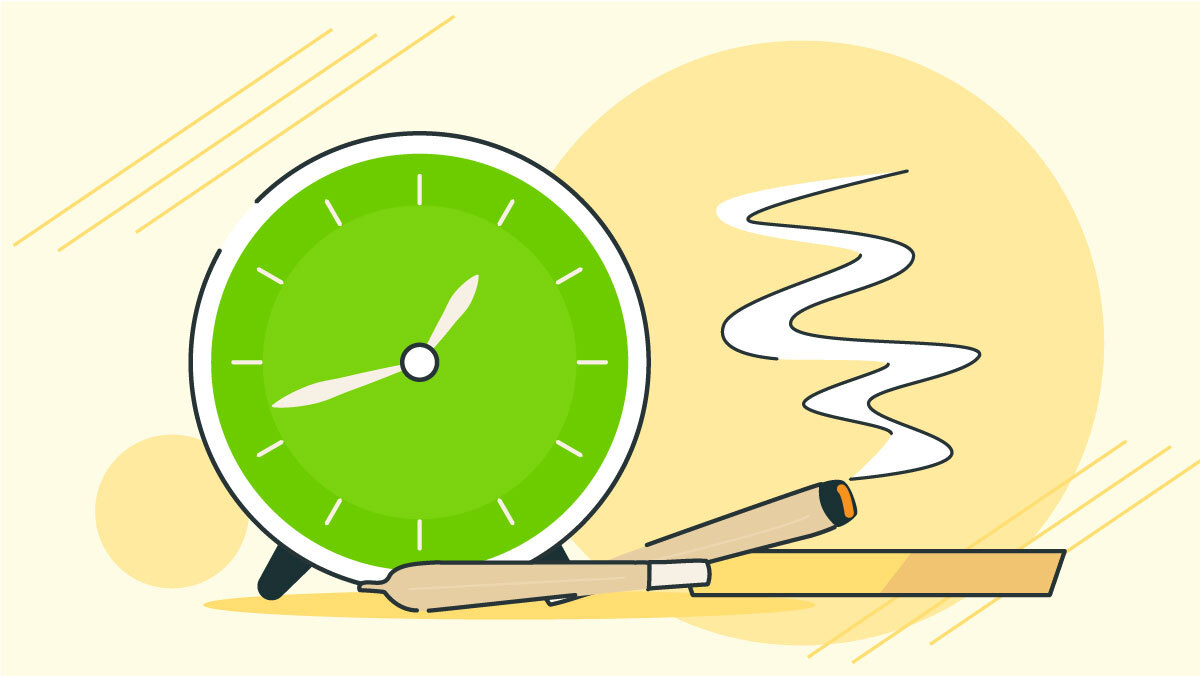How Long Does a Weed High Last?

OK, you’ve asked the question: how long does a weed high last?
Sorry, we can’t answer until you answer a few questions for us.
Are you smoking, eating an edible, or dabbing? How potent is the product? How much are you consuming? How much weed experience do you have? How high is your THC tolerance? What’s your metabolism like?
All of those answers will have a direct impact on how long you’ll experience the psychoactive effects of marijuana.
We’ll start with a tease: the high from edibles lasts longer than the highs from smoking or dabbing.
Want more information than that? Read on — the more specific answers require some explanation.
How Weed Delivers Its Effects Into Your System
You certainly know that THC is primarily responsible for weed’s effects, although other cannabinoids, terpenes, and flavonoids can enhance THC’s effectiveness through the “entourage effect.”
So how exactly does THC work its magic?
(Warning: science ahead.)
The body has an extensive messaging system called the endocannabinoid system, which facilitates communication between the nervous system and the rest of the body. Messages are carried by neurotransmitters called endocannabinoids, and they are sent and received through ECS receptors located throughout the body.
THC has a molecular structure almost identical to a key endocannabinoid, so it’s able to interact with ECS receptors and affect the messages that are (or aren’t delivered). That’s how cannabis gets you high and provides health benefits once it’s in the body.
But how does THC get from a joint, dab, or edible to the ECS receptors? It depends.
When you inhale weed smoke or vapor, THC is absorbed by tissues in the lungs and quickly sent into the bloodstream. It’s then carried to the brain and other parts of the body. Within minutes, it’s interacting with the ECS.
However, the story is quite different when you eat a weed-laced edible. You swallow it, of course, and it ends up in the stomach where it has to be digested. The THC is sent to the liver, where it’s transformed into metabolites.
A metabolite that is known as 11-hydroxy-THC — and not THC — is what’s finally released into the bloodstream and reaches ECS receptors. 11-hydroxy-THC provides the same psychoactive effects as THC, but it’s even more potent.
Digestion and metabolization take time, so the THC metabolite created when you consume an edible doesn’t reach the ECS within a few minutes. It takes 30-60 minutes, and sometimes even longer.
Here’s the Cliffs Notes version:
- When you inhale smoke or vapor, THC is absorbed into the body within seconds, and it takes effect rapidly. You’ll be getting high in ten minutes or less after a toke.
- When you eat an edible, it usually takes 30-60 minutes before you feel the effects. And the high is provided by a THC metabolite that’s even more potent than THC.
Don’t worry — we weren’t just wasting your time. All of that information will come in handy.
How Long Do You Stay High When You Smoke Cannabis?

And we’ll use the information starting now.
We’ve established that when you smoke, THC gets to the brain (and the rest of the body) within 10 minutes. That means you start to get high quickly, and weed’s effects peak shortly after that. (The same is true for vaping.)
Blood THC levels usually reach their highest point about 30 minutes after your first toke. Depending on how much you smoke and how potent the bud is, THC levels will remain at their peak for another 30 minutes or so before they begin to drop.
The “tapering” of effects lasts another 60-90 minutes, again depending on how much weed smoke you’ve inhaled and its potency. So the high lasts about 2-3 hours in total, with the final hour less intoxicating than the first one.
How Long Will You Stay High When You Dab?
When you dab concentrates like wax or shatter, you’re also inhaling smoke. The smoke is simply produced differently, by heating concentrate to a very high temperature instead of by setting fire to flower.
You might guess that smoke is all the same; the effects of a dab would be about the same as a hit on a weed pipe.
It doesn’t quite work that way.
Marijuana’s THC content usually averages between 10-25%. The THC content in concentrates, though, can be as high as 80-90%. That’s the big reason why many experienced users prefer dabbing.
It’s also the reason why dabbing often provides some users with a longer-lasting high than smoking. It may last as long as 3-4 hours.
On the other hand, those who dab regularly are likely to have developed a greater tolerance, so they often need greater amounts of THC to get high. They may find that high lasts only about two hours or so, just as it does when smoking.
One other note: when you vape concentrate, you usually don’t get as much THC as you do when using a dab rig. The high will last about as long as the one you’d get from smoking weed.
How Long Does Being High from Edibles Last?
If you think back to our science discussion you’ll remember that it takes longer for edibles to kick in and that the 11-hydroxy-THC that gets you high is stronger than the THC in weed. It’s also more bioavailable, which means more of the 11-hydroxy-THC will provide its psychoactive effects.
Both of those factors affect how long the high lasts when you eat an edible.
Generally speaking, you’ll feel the first effects within an hour. They’ll ramp up more gradually than they do when you smoke up, reaching their peak about a couple of hours later and slowly tapering off after that.
In other words, more potency and greater bioavailability produce a lengthier high once the 11-hydroxy-THC finally hits. The full experience lasts an average of 6-8 hours but could linger even longer if you’re consuming a potent strain.
That should be enough information to let you choose the right administration method to let your weed high last as long as possible — or to make the high just quick enough to wake, bake and get to work.
How Long Does a Weed High Last: FAQ
Q: How long will the high last if you drop tincture under your tongue or take a THC capsule?
A: Those methods may be different, but the basics we’ve discussed still hold as true. If you administer THC sublingually, it’s absorbed immediately by the tissues under the tongue and heads right to the ECS receptors; the high lasts about as long as the one from smoking. If you swallow a capsule it has to be digested, so the processes and time frames are about the same as if you’d consumed an edible.
Q: All of the times you’ve mentioned seem approximate. What else can make the high last shorter or longer?
A: The most important factor is the THC content of the weed, concentrate, or edible. Others include how much you consume, your level of THC tolerance (which is often higher if you’re a regular user), the speed of your body’s metabolism (a faster metabolism will process and clear THC more quickly), how much you weigh, and even your sex (it’s been shown that women develop tolerance to THC’s effects more quickly than men).
References
- Ferber, S. G., Namdar, D., Hen-Shoval, D., Eger, G., Koltai, H., Shoval, G., … & Weller, A. (2020). The “entourage effect”: terpenes coupled with cannabinoids for the treatment of mood disorders and anxiety disorders. Current Neuropharmacology, 18(2), 87-96.[1]
- Lu, H. C., & Mackie, K. (2016). An introduction to the endogenous cannabinoid system. Biological psychiatry, 79(7), 516-525.[2]
- Lemberger, L., Martz, R., Rodda, B., Forney, R., & Rowe, H. (1973). Comparative pharmacology of Δ 9-tetrahydrocannabinol and its metabolite, 11-OH-Δ 9-tetrahydrocannabinol. The Journal of clinical investigation, 52(10), 2411-2417.[3]